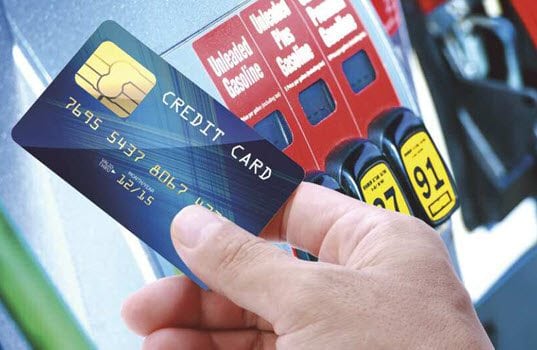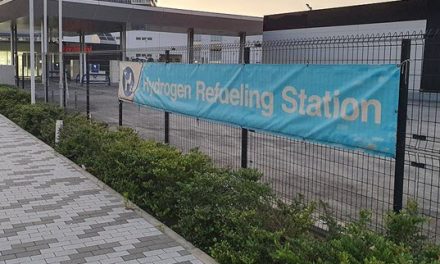By Richard Browne, Patriot Capital
Gasoline retailers need to develop a plan for EMV on the forecourt. Is 2016 the right time to upgrade gas pumps to EMV?
New requirements to cut down on the fraudulent use of credit and debit cards, enhanced marketing capabilities, lower maintenance costs and the opportunity to take advantage of tax incentives – including bonus depreciation and Section 179 benefits – and are among the main reasons gasoline retailers are looking to upgrade gas pump upgrades in 2016.
Payment cards with magnetic strips are being rapidly replaced in consumers’ wallets and at point-of-sale locations nationwide. EMV chip technology has been proven to cut down on fraud, and U.S. retailers in all market segments, from big-box retail to convenience stores, are upgrading their mag-strip equipment with EMV chip-card POS terminals.”
EMV–which stands for Europay, Mastercard and Visa–is a global standard for cards equipped with computer chips and technology used to authenticate chip-card transactions. In the wake of large-scale data breaches and increasing rates of credit-card fraud, U.S. card issuers are migrating to this new technology to protect consumers and reduce the costs of fraud.
“These new and improved cards are being deployed to improve payment security, making it more difficult for fraudsters to successfully counterfeit cards,” said Julie Conroy, research director for retail banking at Aite Company, a financial industry research company. “It’s an important step forward.”(1)
For merchants and financial institutions, the switch to EMV requires adding new in-store technology and internal processing systems, and complying with new liability rules. For consumers, it means activating new cards and learning new payment processes.
The traditional magnetic strips on credit and debit cards contain unchanging data. The information in the magnetic strip gives thieves access to sensitive card and cardholder data necessary to make purchases. Unlike magnetic-strip cards, the computer chip in EMV cards creates a unique code for each transaction that cannot be used again.
Studies show consumers are more worried about credit card fraud than ever before, and American financial services companies have followed the lead of their European and Asian counterparts in switching over to these so-called “smart chip” cards, which have been proven to cut down on credit card counterfeiting.
Since more than 50% of gasoline transactions are pay-at-the-pump purchases, the lack of human interaction makes gas pumps a prime target for thieves trying to use stolen or counterfeit credit cards.
Data show that in England, where EMV cards replaced the old magnetic-strip technology in 2004, fraud fell by 33% immediately. When France implemented the new technology in 2005, counterfeit card fraud dropped by 91% and credit card theft declined by 98%.
Across the border in Canada, which adopted the EMV technology in 2009, debit card losses fell by 33% from 2009 to 2012, dropping to $39 million annually from $149 million in 2008.
“In our market, as consumers became aware of the EMV chip cards and their perceived higher security, they began to favor and look for fueling locations that had EMV card readers,” said Canadian Tire Petroleum President Bruce Allen.
Not only do consumers prefer the protection afforded by EMV card technology, U.S. fuel retailers will be footing the bill for credit card fraud by fall of 2017 if they don’t replace their old magnetic strip readers. Retailers still using magnetic-strip technology took on responsibility for fraudulent in-store purchases in October, 2015, and liability for fraudulent forecourt (pay-at-the-pump) purchases shifts to store owners in October, 2017.(2)
Gasoline retailers who wait until after October, 2017, may become responsible for fraudulent credit card purchases made at their pumps; the banks issuing the cards are shifting the liability.
That deadline has led gasoline retailers who have not already made the switch to seek the most economical methods to pay for the new technology and match their expenses with their cash flow; that’s where equipment financing comes in. Having an upgrade plan that aligns capital spending for fueling equipment with annual tax limits can provide money-saving tax benefits.
For capital spending of up to $500,000 on new or used equipment, 100% of the investment may be deducted in the current year under Section 179. For capital spending of $500,000 to $2 million, bonus depreciation allows 50% of the capital investment to be deducted in the current year.(3)
In addition, the Alternative Fuel Infrastructure Tax Credit provides a 30% tax credit for the installation of eligible alternative fueling equipment, but it will expire at the end of the year.
This tax credit offers a straight deduction from taxes owed, but it’s only allowed in 2016.
Waiting until 2017 could present many challenges for upgrading gas pumps, according to Conexxus, a member-driven technology association of fuel retailers. Issues include the time it takes to manufacture the new hardware, and a dearth of qualified technicians needed to do the actual at-the-pump installations.(4)
“There are not enough technicians,” said Conexxus Executive Director Gray Taylor. “I estimate we need 3,000 technicians to do 4.5 million man-hours to install retrofits and pumps. If something goes wrong with a pump nozzle, forget it, you’ll have to fix it yourself.”
Dispenser manufacturers will have to ramp up production by 150% to keep pace with demand. “That’s going to be a challenge,” he said.
“Many dealers will face hardships. Those who lag behind may be at risk of fraud,” Taylor explained. “Our estimates point to a potential increase of 19 basis points as fraudsters seek non-EMV victims to use for passing counterfeit cards, enough to put a retailer out of business. Believe me, we will have store closures.”
 Richard Browne is Vice President, Marketing, at Patriot Capital. “Patriot Capital, a division of State Bank and Trust Company, specializes in enabling entrepreneurs to succeed by providing hassle-free equipment financing in the retail and commercial fueling verticals and other retail and manufacturing industries. Working with its customers to enable them to optimize their financing and capital structures, Patriot Capital is a leading provider of capital equipment financing and leasing to NACS (National Association of Convenience Stores), PMAA (Petroleum Marketers Association of America) and SIGMA (Society of Independent Gasoline Marketers of America) members. (5)
Richard Browne is Vice President, Marketing, at Patriot Capital. “Patriot Capital, a division of State Bank and Trust Company, specializes in enabling entrepreneurs to succeed by providing hassle-free equipment financing in the retail and commercial fueling verticals and other retail and manufacturing industries. Working with its customers to enable them to optimize their financing and capital structures, Patriot Capital is a leading provider of capital equipment financing and leasing to NACS (National Association of Convenience Stores), PMAA (Petroleum Marketers Association of America) and SIGMA (Society of Independent Gasoline Marketers of America) members. (5)
Patriot Capital does not provide tax, legal or accounting advice. This material has been prepared for informational purposes only, and is not intended to provide, and should not be relied on for, tax, legal or accounting advice. You should consult your own tax, legal and accounting advisors before engaging in any transaction.
Contact: Richard Browne cell: 404.977.1251 / [email protected]
ENDNOTES
[1]http://www.creditcards.com/credit-card-news/emv-faq-chip-cards-answers-1264.php
[2] https://www.patriotcapitalcorp.com/category/emv-information-cstore-and-gas-station-owners/
[3] Patriot Capital does not provide tax advice; please consult your tax professional.
[5] http://www.patriotcapitalcorp.com/getting-approved/









